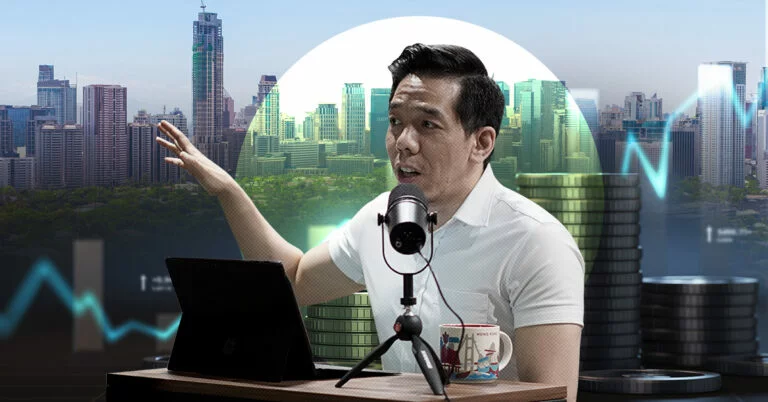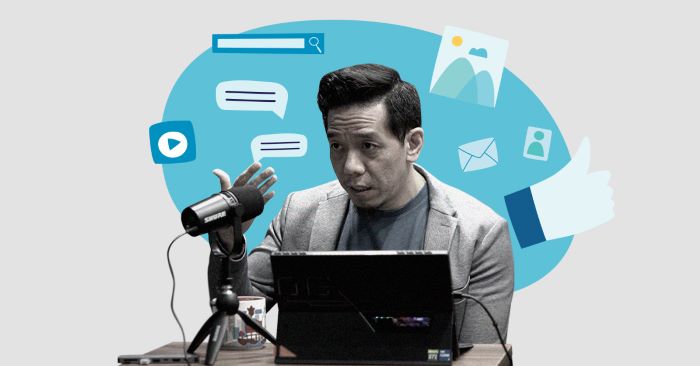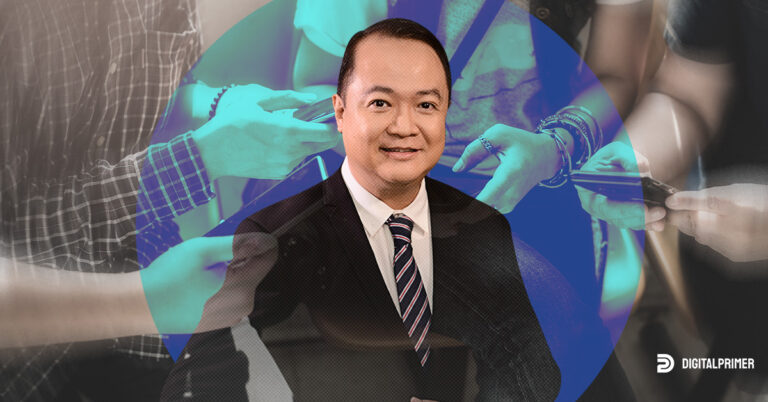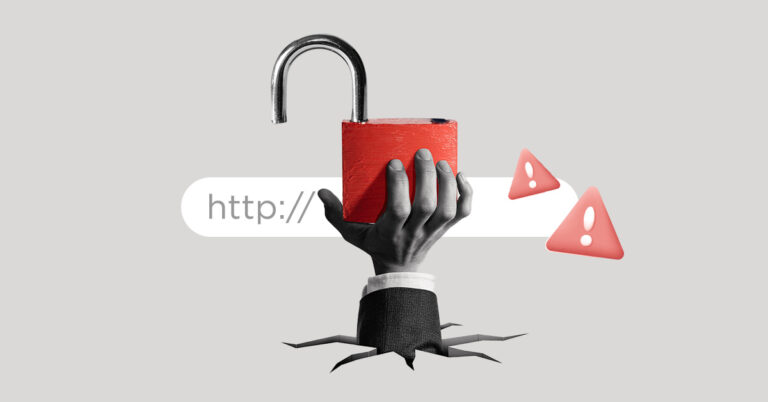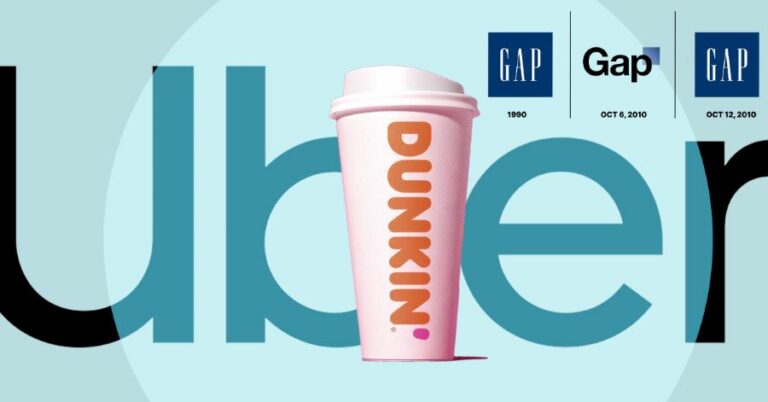Truelogic DX Podcast Ep 5 Recap: Be Heard and Podcast: Amplify your Brand’s Voice
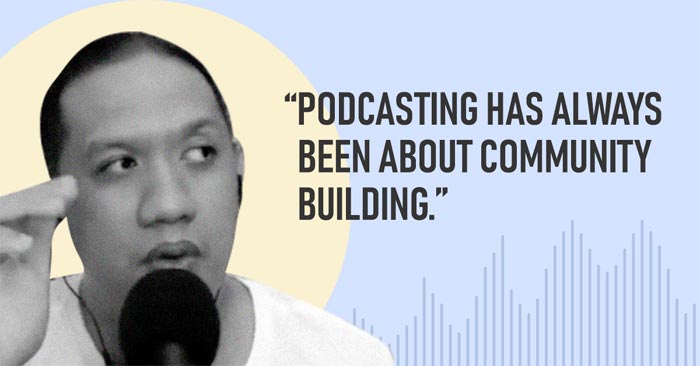
Did you know that the Philippines is ranked 6th as the fastest-growing country by podcast listening? Since the start of the pandemic, there’s an unprecedented growth of over 42% increase in podcast consumption globally and 100% in the Philippines alone; with 31 million active and regular listeners.
Founder and CEO of Podcast Network Asia Ron Baetiong gives an overview of how podcasting transcends in the Philippines, how it’s becoming the new word of mouth, and is good for your business too?
Podcast Transcription
Hi, good afternoon everybody. Thank you for joining us on the 13th installment of Truelogic DX. Again, I’m your host for this afternoon. My name is Bernard, it’s a pleasure to have you joining us again, like after 13 tries and you’re still here, right? I gotta love it. I’m not sure if you guys noticed, but Truelogic has started podcasting.
We do our podcast recordings every Monday. We decided to include it as part of our marketing toolkit. And, you know, it’s an ongoing experiment. I think if you’re a marketer it’s super important to continuously be experimenting on what strategies work and what strategies don’t.
There are some impressive stats in terms of broadcast growth in the Philippines, which is why we decided to dive into it as a channel. I think, for example, in terms of growth in podcast audiences, the Philippines ranks sixth and we are now at about 31 million listeners in the Philippines.
The majority of the people that listen to podcasts, by the way, if you are interested, if you’ve got a target audience within the range of about 23 to 34 thereabouts, it might be a good channel for you because they seem to be the ones that are adapting to it, and they are the mainstream podcast audience.
And a lot of it, of course, is the pandemic. So we thought if we’re going to talk about on-demand content, if we’re going to talk about podcasts who better to have joined us this afternoon than the founder of Podcast Network Asia, Ron Baetiong. Thank you for joining us today.
What is Podcasting?
It’s odd because podcasting has been around for over 20 years ago. The term podcasting actually originates from the word iPod, which is “Pod,” and “casting” obviously in broadcasting. And for the longest time, I mean, this has been around but, it became an Apple-only thing. Because again, predominantly the way you consume podcasts, where you download them on your iPod. It’s a podcast. But it’s only just a few years back where streaming was the default. Because before the only way you could listen to a podcast was to download it just like an MP3 file before the old times. Right now you can stream it.
And it became mainstream with the push, and credits to them, and I always say this, on Spotify. Because now, especially in this region in Southeast Asia especially Indonesia and the Philippines are very, very similar. Indonesians and Filipinos, obviously there are at least 963 million podcast listeners in both countries. And we’re just 30, or 31. That’s always 3x Philippines, and how things are in the West. But the one thing that’s common is they both love their music.
Podcasts are another long-form content that’s available on the streaming service that makes it super easy for them to do the transition, right. Without having to write.
Podcasting Popularity in the Philippines
I remember going to events like Blogapalooza and Blogopoulos years ago, like maybe even almost a decade ago where bloggers were talking about podcasting, but it didn’t pick up then.
Is it all thanks to Spotify for making a big difference in terms of popularizing podcasting?
Not entirely. There are obviously a lot of factors, but again, Spotify is one. Number two is the creators, right? Because if you listen to a lot of the podcasts before, the only decent one that had proper equipment was Mo Twister. He was the granddaddy, right?
Other than Spotify it’s those types of creators who are now coming into professionalizing, like using equipment like this, using studios like this, and wanting to create.
And then, the third is really the most important thing: consistency.
Now it’s a whole new world of new content creators that you’ve never seen before. People you’ve never heard of. And these are kids and Gen Z people. And they break new barriers in terms of ranking and whatnot.
Podcasting for Business
There are usually two or three routes that I see. It depends on how they want to, how urgent, and what’s the narrative. It’s either you go wide or you go deep or somewhere in between that’s the third, or a mixture of both.
1. Go wide or deep
You go wide, meaning, “Okay, I want to get this message out on-demand across these communities.” Because the way you utilize podcasts is the same way you advertise in baseball. You zero in on who’s the audience, right? In terms of the audience, you then match it with the right content, creators that speak to that audience constantly. If you’re looking for a quick wide reach you go advertising. Now, it’s going to be spoken from the perspective of the content creator. It’s not going to be a jingle like what we do on the radio.
How urgent is your message? How urgently do you want this to go? Because if you need the word out, advertise. Because there are ready content creators that are there to not just talk about you, we also have the ability in Podcast Network Asia now to dynamically insert a relevant ad to the listener for evergreen content. When I say evergreen content it’s episodes from 2, 3, 4, 5 years ago.
2. Utilize a hybrid approach
So let’s say the situation is moderately urgent, only moderately urgent. And the brand wants to be top of mind. When you create a campaign, the call to action is the most important thing. Which is, the beauty of it. Then you can go create your own.
We always recommend that to brands as well. When you create a campaign, the call to action is the most important thing. The beauty of it is, that podcasting is long-form digital content. You don’t have many mediums in digital that capture a person’s attention for at least 45 minutes and above.
Podcasting Best Practices
1. Invest in a good mic
It’s garbage in, garbage out. So you have to invest in a good mic. Regardless of what you say, if you just sound like you’re a piece of a tin can, your audience won’t retain anything.
2. Practice makes perfect
Number two, practice. Practice talking because at the end of the day everybody thinks that they are a great talker until they start recording and [get] feedback. “Hey, did I just talk a million miles, and you [didn’t understand anything]?”
3. Always iterate
Always iterate. Because it’s rare that your very first version of your show would be the final one. To iterate, persist, and adjust until you find a formula that works. This is a long game. This is a marathon. Don’t expect it right away. It’s very rare that somebody becomes a hit right away. And usually, those ones that [become] a hit already have prior clout. That’s why they were chart-toppers by default.
How will you measure success in podcasting?
It’s not just the vanity metrics of how many people listen. It’s how many people you keep through retention. Meaning from the start of the podcast from zero, zero all the way through however long the run time is. How many people dropped off? And the ones that need help are the ones that, you know, probably lose a good 50% of their audience in the first 5-10 minutes. That means whatever you said in those first five minutes, there, there’s something wrong. So whatever you said after that, if they’re not there, nobody cares.
If you’re trying to build an audience on your own then that will be a long game, and that would be audience building per se. Also temper the right expectation for the brands that are listening or watching at the moment, the median podcast downloads or the 50th percentile is only around 200 downloads for every [podcast].
Right? You’re only probably in the top 5% of shows already. If your podcast gets a thousand downloads. And that’s good enough for you to be in the charts, in the Philippines actually.
CPM and CPA is something that also does [happen] in podcasting.
So if you want to lose your cost per acquisition, you can do affiliate marketing campaigns on podcasters, especially the smaller ones who are [doing] that. If you’re going to go CPM, again, if it’s a shorter campaign, yeah, that’s a good way to do it because you can tap into the back catalog of the whole podcast.
Super simple. I’ll just use my podcast, Hustleshare. I have 300 episodes that are averaging around 500 listens. If you’re tapped into that, then you can tap the whole catalog. I’m doing that. Or here’s the one thing that I see that really converts – it’s sponsoring the right content creator that’s a fit for your brand and riding that wave on the way going up, right? Because I’ve seen in terms of shows, the average base of audience growth that I see so far, and this is just within our network is 15 to 20% month on month.
Noteworthy brands that use podcasting as part of their marketing strategy
1. McDonald’s
They’ve got multiple campaigns where, you know, you’re now tapping into a ready community. The call to action is simple. Go to a drive-thru to get their breakfast. And now they give freedom to the podcast. Or, “Hey I need you guys to convince your listeners to blah.” And now people flock through to create traffic in a drive-through space because of this campaign.
And it’s so good that they keep repeating and McDo sees the value in it. That’s the magic of podcasting because you’re now able to create FOMO, you’re able to really see the value proposition.
2. Philippine Stock Market Weekly
Now let’s talk about branded podcasts. So it’s your own show, you tell your own narrative.
It’s short. It’s not really that long-form, 15-30 minutes tops. But now you’re able to deliver these messages. And that show is almost three years old now. And they’ve been consistent; being one of the top business podcasts out there.
Podcast Network Asia as a Start-up
In PNA, when I started podcasting myself when I was doing Hustleshare, my first podcast, I did that for a good six years, but there are three main problems that I saw:
- First one, again, there are not enough content creators. 20% of the top 200 were Filipino. Like, man, there’s so much consumption, not enough content.
- If there was enough content, the quality was again, various from it sounded like you’re in the bathroom.
- And third, is that if whoever was successful, nobody is monetizing it.
So it’s those three combined, then you need to do an interplay. Because again, at the end of the day, you want good quality and scale. You want to be able to solve those things. So not enough content creators, then, empower so many creators. We went from literally five to, as we speak right now, with our new platform, we have 284 in two and a half years. So, I dunno how we were able to do that. We’re, it’s crazy how talent can do that.
The second thing is we were able to now get the best supply and represent multiple podcast verticals across multiple categories. So name it, name a format, we probably have done that multiple times already. Horror, comedy, interview, whatever; we’ve done that.
And third, we’ve also helped monetize. And the reason I was able to identify and we were able to identify these things is because again, I came from the startup ecosystem. In the same way, the startup ecosystem was built here in the Philippines. And then needed a lot of interplays to bring the community together, to educate people, to help them go through the ropes, and then invest heavily until you harvest where there’s now an uptick.
In the same way, the start-up system is now, we have to plant so many seeds, then hopefully there’ll be a bean stock down the road that plows through the sky.
If you guys want to collaborate with existing podcasters, 21% of the top 200 podcasts in the Philippines are co-produced by Podcast Network Asia.
When we started in 2019, only 20% were Filipino-made. We had to create a quality supply. Now 21% of all the top 200 podcasts in the Philippines are made by us. Plus, we have in the Philippines, we have over 160 shows. Any type of community, we probably have that already. We have so much more room to grow.
We’re ready to help you out. And if you want to create your own community, we productize what we do in PNA. So then we can do this at scale. You can check out podmachine.com and sign up for as low as 50 bucks, $49.99, we can help you create a podcast and edit that for you. For four episodes online, we made it right. Anyone that wants to create a podcast, but [doesn’t] want to edit their episode and grow their show, we got you covered.
Frequently asked questions about podcasting
1. How do you pick the right collaborators?
What’s your audience? What audiences are [you trying to attract?] What’s the narrative, what type of angle are you doing this for, and whatnot. And then we give you a shortlist.
The other collaborator has to be somebody that speaks to the same audience that we do. That’s where the community of having a network thrives together. And we always say this as corny as it sounds, the rising tide lifts all boats. Right. And we want to be that tide. We’re not a wave. We’re a tide that lifts everybody to that same level.
2. How do you pick the right content creator to sponsor?
Let us know what type of community we need to tap [into]. ‘Cause, we know our podcasts down to what they say now. Along with what the audience is and what the best angle [is]. For sponsorship, we say, alright. We actually project their growth curve in the next coming month. If you come in here, this audience is probably going to be at this level, right. That time already.
3. What’s the cost of sponsoring content on a podcast?
I haven’t seen a seven-digit cost yet. It was still cheap. The ones that I’ve seen are still within the six-digit budget range. Seven digits, you’ll burn that very quickly on other platforms. Here, you’re getting the whole read-through for a long strip specifically. I recommend at least three months [of] sponsorship. Then you create that relationship with [them].
Is it too late for businesses to go into podcasting in the new normal?
The wave is just forming, or it’s just a little bump that you’re coming in. And we’re just seeing, in terms of context, Indonesia as we speak is the third or fourth biggest podcast country in the world. So I’ll just give you the big numbers. There are around 4 million podcasts in the world. All right.
The ones that are active are hovering around 800K more or less 900K that actively produce content [in one] month. That’s the world. 1.7 million of all these podcasts, a lot of them are not active, are in the US. In the Philippines, we’re not even in the top 10 yet.
But it’s no longer too early to the point that you’re probably going to get fired after. It’s not because you’ve seen really good use cases now of the brand. So here’s a perfect example of a brand that came in at the right time with the right narrative, and they’re now successful. There’s this new podcast that we’re also helping co-produce. It’s called An Open Mind with Liza Soberano. It is a branded podcast by this app called Mind You.
1. Is podcasting killing the radio stars?
It’s not killing. [In] the same way YouTube didn’t really kill TV. But the upside is obviously in the podcasting space. Why? Because it is on-demand. Like then I remember I could only listen to The Morning Rush when I’m alone, right. Nobody’s recording that. And if I want to listen to The Morning Rush, if I want to rush to my office at 11 and they are podcasts, I can listen to The Morning Rush whenever I want. And you’re not buying airtime. You’re buying CPM here. You’re bringing the flexibility that radio does not have, unfortunately.
2. Will podcasts face censorship or regulation in the Philippines?
It depends on the government that you’re going to vote for in the next few weeks, right? But at the end of the day, people could always say there’s always censorship and whatnot. But the same way nobody’s ever really able to censor YouTube, you can de-monetize people, but for penalizing them, for cursing the digital, it’s going to be very hard.
Podcasts [are] most of the time an opinion piece, or an entertainment piece right? I don’t think PNA claims to be an arbiter of truth in the same way that Twitter, Google, and Facebook claim. We are not arbiters of truth. We are a free speech platform. So, and I think that’s going to be hard to censor if you’re a free speech platform. But regulation, yes. To find out how likely regulation here is going to be. I would say we got to look for our neighbors, right?
But the EU has some active regulations on Internet usage. In Australia, Google can no longer publish monetized content by publishers, right?
So they can no longer feature snippets of content or go directly to a page. That’s got a paywall. So there’s that in the US there’s regulation now, more regulation about privacy. So, but I think regulation, likely; censorship, we’re probably not even on the horizon yet. I mean, anything is possible.
4. Are podcasts for a market appeal or community building?
It’s community-based by default, but it’s starting to become a mass-market because that community grows exponentially now. We’re coming in at a point where it’s on the uptick. So ask that community, when you support the podcasts, especially long term. If you sponsor and you become a co-presenter, you’re riding the wave when it goes for the uptick and you all of a sudden become synonymous.
5. Should I build a community first before I create content?
It’s not zero-sum. You can do it together. So again, if you’re going to do the hybrid approach or you can tap into the audience of an existing show and also build your own content at the same time. The call to action should be, “Hey, this is what we have. But if you also want to listen to us, because we have our own podcast that meshes the same narrative that you’re hearing it from, you can listen to this too.”

